I’m gonna take a couple of weeks off from creating new blog entries. So Happy Holidays and a great 2 * 17 * 59 to all of you. [Factorization corrected after Fred Condo pointed out I'd posted it wrong. I was 17 when I finished hi-skool and I'm 59 now. Therefore…?]
I’d like to get a comment thread going that will keep some interesting stuff happening here. Thus my “End of the Year Question” on what life will be like after the Singularity.

By way of background, about two and a half months ago, I solicited comments from you readers in an entry called Need Help Understanding Supermind Experience.

I picked up some really useful ideas from the comments, some of which worked their way into a story called “Postsingular” that I sold to Asimov’s SF magazine a couple of weeks ago. And now I’m working on a follow-up story and I want more help from the hive mind.

The set-up:
The Earth is blanketed with self-reproducing nanobots called orphids (derived from “arphids” derived from RFID). Each of them is about as smart as a dog.
Rather that reproducing without limit, the orphids have thoughtfully leveled out at a population density of one or two per square millimeter on every surface on the planet (rocks, leaves, auto parts, skin).
Orphids use quantum computing; they propel themselves with electrostatic fields; they understand natural language; they’re networked by wireless.
They’ve settled onto people’s heads like lice, and they’re using magnetic fields to provide people with device-free orphidnet (super Web) access all the time. Thanks to their orphid lice, everyone is continually plugged in; everyone has a HUD (heads-up display projected over their visual field inside their brain). And thanks to the orphidnet anyone can in some sense see anything (or at least the orphid mesh on the object).
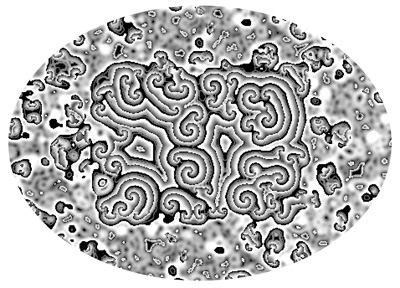
Higher-order AIs have evolved within the orphidnet — they’re called beezies. Some of the beezies are perhaps thousands as times as smart as us. And the smaller beezies are willing to help humans with tasks. Everyone has agents doing thought routines for them.
The question:
What will life be like in this post-Singularity world?
Here’s a few preliminary thoughts about this from my notes for my sequel to “Postsingular.” By the way, the story-in-progress has the working title “Bixie and Chu.”

How do people deal with the orphidnet day in and day out? Maybe they’re casual about it, used to it. After all, we’ve changed our tech so much since, say, Hieronymus Bosch’s time, but we act the same.
A lot of what people do is, no matter what the tech, based on the simplest biological needs.
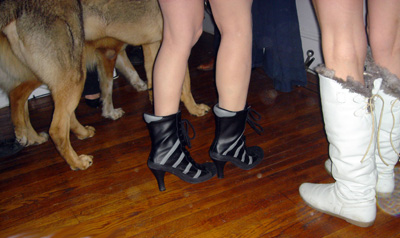
Mating. Even if we have vat-grown children, there’s still competition to find a good partner to contribute a sperm or an egg, and to help raise your children. I think people would always prefer to raise their own children if possible, as this seems likelier to produce good outcomes.
Absolutely no privacy. Less shame about sex, less mystery. Yet, there are still the same reproductive issues, which are probably a root cause of modesty, which might be a way of playing one’s reproductive options close to the vest.

[Photo documenting my friend Charles Platt’s single day as a worker at a big box store.] Food, shelter, and what people own will inevitably be distributed according to the pyramidal inverse-power law statistics (a tiny number of very well-off people and a huge number of poor ones) that inevitably emerge in group computations.
But, with the orphidnet, you can get a lot of what you need for free, if people are generous, and why shouldn’t they be. Recycling. The whole world is a realtime EBay. You can always find leftover food. People set it out, like pies for bums. Just-in-time bread and breakfast. Couch-surfing is practical; particularly if there’s very little chance of crime.
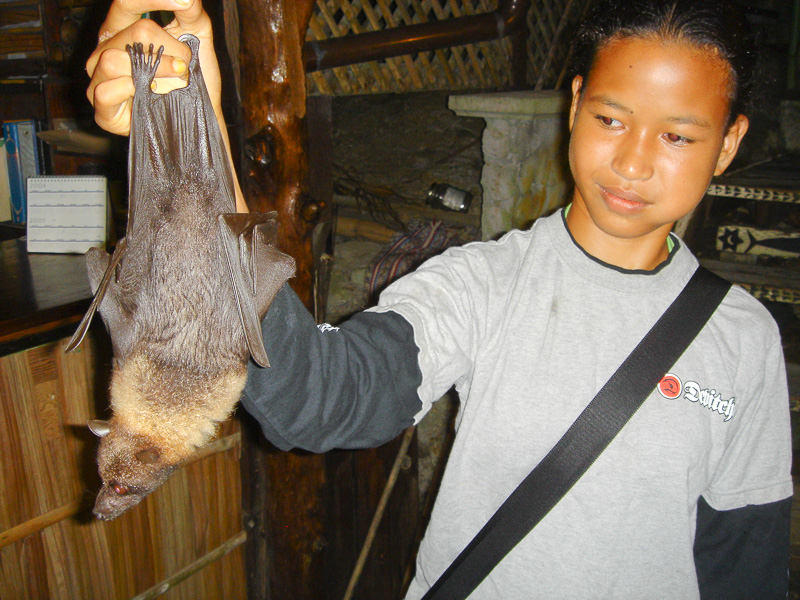
We might suppose that in the Postsingular world, when people talk, emoticons form around them, visible in the computeresque overlays that everyone has happening with their brains, the Smileys hopping out of a speaker’s mouth. Also there will be more functional images, e.g. a copy of a bat that you’re referring to.
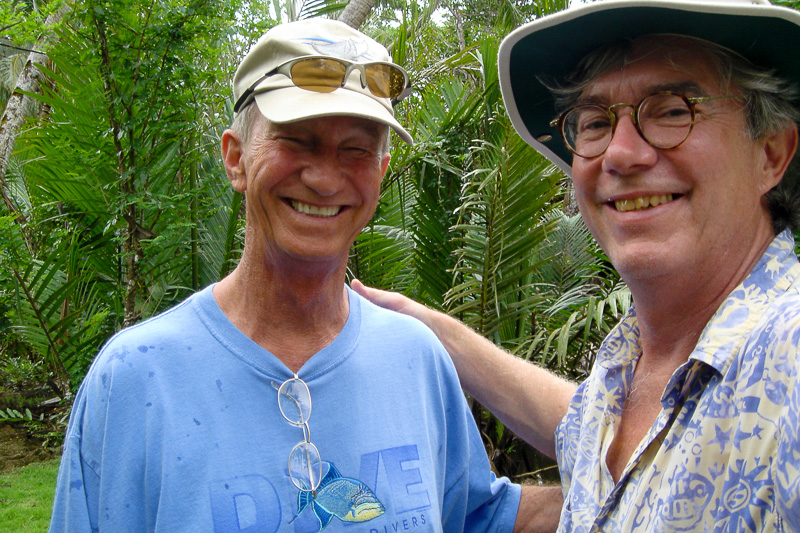
There’s a fad for going offline. “Going on the natch.” [That's my brother Embry and I in Micronesia, a high point of 2005.]
The orphids are in principle willing to turn off a person’s brain interface. Probably there will be some sleaze-ball spammer types trying to override that to push ads, scams, and political propaganda. (I’d like to have a scene with implacable orphidnet-controlled “shoon” robots attacking Heritagist spammers.)
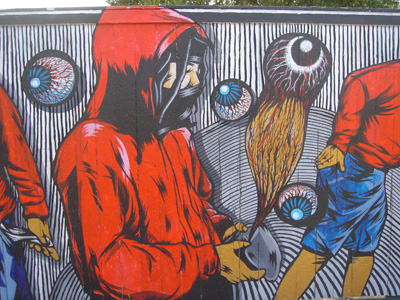
Violent crime has become impossible to get away with. People can always watch you; and even if they see you do the crime, the orphidnet remembers the past, so anything can be replayed. If you do something, people can find you and punish you.
On the other hand, you can still behave like a criminal if you have indomitable physical force. Like if, for instance, you’re the government.
Perhaps there are some war-lords as well. Thanks to the all-seeing orphidnet intelligence it might be hard for the government to catch and swat criminals.
After all, with the orphidnet, anyone can mount what I call a “Golden Man” defense (the name comes from a Phil Dick story where a mutant always knows what’ll happen next, so nobody can kill him). But if your pursuers have the same knowledge, maybe it’s a wash.
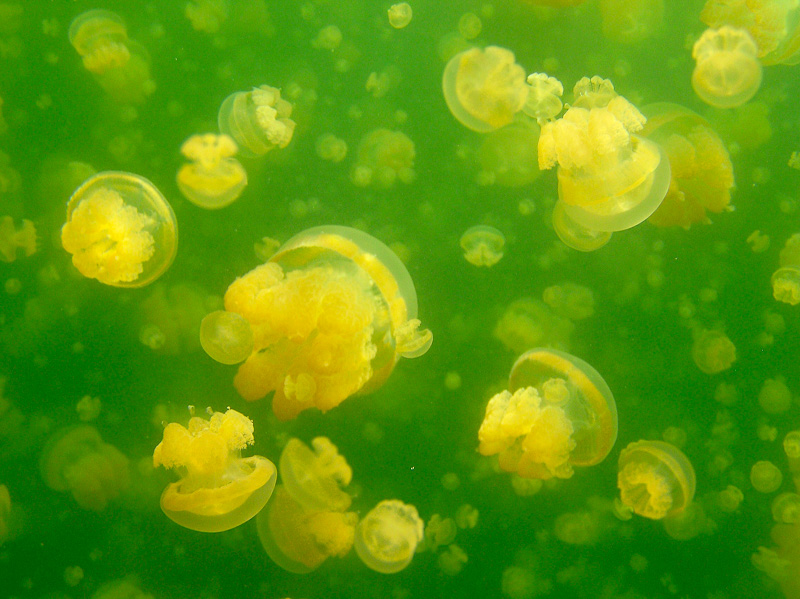
Conceivably the orphidnet beezies might favor certain people and give them the benefit of a deeper-ply look-ahead than is available to the common ruck and rabble.
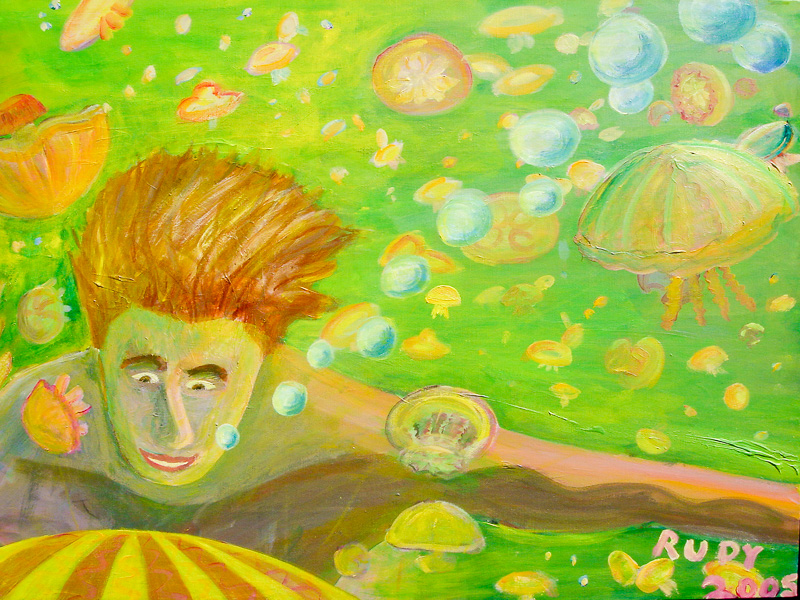
(Here's a link to large version of my “Bela and the Jellyfish.”)
Merry X and Happy New Y!









December 19th, 2005 at 1:43 pm
Thinking of post singularity makes me tired.
Maybe we will not be able to stand it. So I would like to start an oasis where electricity didn’t work and you just breathed air. Sitting Offline taking a break. Not communicating; not imaging, not getting cleverer, but recovering.
In the vein of Red Mars I would like to reinvent the Postage Stamp and a type of illeteracy where buzz-words don’t connect.
I think I envision the singularity as global stupidity and to recover our intelligence we are going to have to surround ourselves with horses. Time will have to be slowed down by something mechanical that ticks loudly but softly in the corner. Photography will have to become difficult again and solely in black & white. Our clothes will not be statements of fashion.
So scattered around the country there are going to be museums where people will live – slowly- whilst the machines and the careerists yak incessantly and never notice the colour of a blade of grass.
December 20th, 2005 at 10:08 am
I’m assuming the orphids and beezies are neutral agents. Like everything else, they would get used for good and evil by humans. Even so, there would be an intense struggle among some people to somehow rid themselves of the orphid lice or fool them. Everyone could see everything, but they could still be masking their intentions. There would be a lot of banality to sift through on the orphidnet, and why look at someone else’s life when it is less interesting than your own? Just another poor shmuck staring off into space masturbating, but he’s really communicating non-verbally with a resistance network.
December 20th, 2005 at 11:59 am
Naturally my first question is ‘how easy/hard would it be to hack orphids?’ Can I have my own orphidnet that your orphids can’t talk to? Can I fix it so your orphids see me on a golden throne instead of my mundane toilet? Can one beezie hack another, or a whole bunch hack into one beezie? What if I like Orphid 2.0 and don’t want to go up to Orphid 2.5? What if Orphid 2.5 gives us all mental popup ads? How many orphids could dance on the head of a zippy? Where would you put your backup files? Would lack of privacy turn us all into blushing wallflowers or egomaniacs, or not? What’s the boiling point of Cesium? What kind of cursing-out could you give someone if you could accompany it with a Powerpoint show in 3D?
I think you’re really asking “Would our culture, and our basic humanity, survive this kind of paradigm shift?” Stross’s Vile Offspring come to mind; physically human but loaded with software that makes them less than human. How big would you like your IQ to be? Oops, too big. POP! Game over.
Remember BEYOND THIS HORIZON by Heinlein? They constantly upgraded humanity but kept ‘control naturals’ around to be sure they weren’t becoming monsters without noticing. Personally, if I wanted to be submerged in a groupmind, I’d get a job at Whalemart or Macrosoft.
December 21st, 2005 at 2:15 pm
hey thanx fer all the phun – 21st start of winter accordingly to some calenderz – FZ would have been 65 eaRTH YEARZ old – i can’t do anything much except to let it ZEn out –
love from The Martian Embassy – they finally had an obit in the Grudian by Chris Priest – that reminded me of yu & sci-fi BOB time
thanx & peace
G
December 22nd, 2005 at 8:58 pm
My first question is: how has the human condition changed?
My second question is: what exactly do the beezies want?
Some details (or, my highly-opinionated ranting):
Perhaps the beezies will allow for a measure of privacy by allowing a “time window” analogous to a tape-delay for a televised sporting event. The worse the neighborhood, the longer the time delay. The more “important” the event, the more look-ahead computation the beezies will allocate: it isn’t necessarily the flashmob, but the orphid swarm.
Maybe there’ll be a fad for Charles Stross-like workers’ utopia communes, or cult compounds, or megacorporation archologies. Orphids aren’t magic fairy dust (maybe magic fairy lube). Fiat currency will be replaced by virtual coupons for orphid swarm resources. Certified geese will lay golden eggs (gold for illustrative purposes only). Fine print will become the new entertainment.
Paranoia will race pronoia, the latest stage in H.G. Wells’ relay race between education and disaster. No one will know which is which.
tom
-=W=-
December 23rd, 2005 at 11:13 am
Rudy, If I wanted to become President would I campaign to the humans or the beezies? Would there be considerably less orphids on toilet seats? Would they get mad if we brushed off our chairs before sitting down, or painted a surface they were stuck to? Would they stick to wet paint, or maple syrup? Could you get a picture of your colon anytime from the orphids you just ate? How many people would be reading over my shoulder right now as I type, and could they insert their own comments? Would this help us invent flying cars faster? Would beezies help old ladies across the street and fight crime like superman? Could I have beezies rob a bank for me, or is it all going to be credit cards and Beast-numbers on our foreheads? Of course, they’d be in our ears so we wouldn’t need iPods, but how would Metallica keep everyone from downloading their album as they recorded it? Oh, and the Golden Man defense has attack points; remember Kuttner’s MUTANT? ‘Kill ’em with machines. Get uphill and drop rocks on ’em. Put ’em in positions where knowing doesn’t help.’
Questions, questions, questions; flooding into the mind of the concerned young person today, as Frank Zappa used to say.
December 24th, 2005 at 12:15 pm
The prime factors of 2006 are 2, 17, and 59 — not as stated in the second sentence of the posting. It’s kind of a rush correcting the arithmetic of a famous mathematician! 🙂 Cheers!
December 30th, 2005 at 11:37 pm
I wonder what the effect on time, memory and the present would be. If you see a constant computeresque overlay wouldn’t you always be a couple of seconds behind reality? Would this gap gradually grow – the more you look at the furthur you distance yourself from the present? Could you trap yourself in your own projected memories? In other people’s? End up going backward through time like a blog until you reached a pre-singularity. Then, game over, play again?